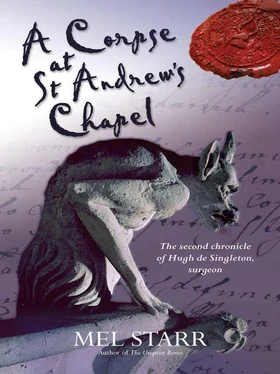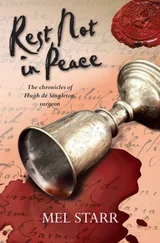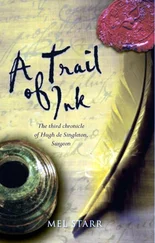Mel Starr - A Corpse at St Andrew's Chapel
Здесь есть возможность читать онлайн «Mel Starr - A Corpse at St Andrew's Chapel» весь текст электронной книги совершенно бесплатно (целиком полную версию без сокращений). В некоторых случаях можно слушать аудио, скачать через торрент в формате fb2 и присутствует краткое содержание. Год выпуска: 2010, Издательство: Kregel Publications, Жанр: Исторический детектив, на английском языке. Описание произведения, (предисловие) а так же отзывы посетителей доступны на портале библиотеки ЛибКат.
- Название:A Corpse at St Andrew's Chapel
- Автор:
- Издательство:Kregel Publications
- Жанр:
- Год:2010
- ISBN:нет данных
- Рейтинг книги:5 / 5. Голосов: 1
-
Избранное:Добавить в избранное
- Отзывы:
-
Ваша оценка:
- 100
- 1
- 2
- 3
- 4
- 5
A Corpse at St Andrew's Chapel: краткое содержание, описание и аннотация
Предлагаем к чтению аннотацию, описание, краткое содержание или предисловие (зависит от того, что написал сам автор книги «A Corpse at St Andrew's Chapel»). Если вы не нашли необходимую информацию о книге — напишите в комментариях, мы постараемся отыскать её.
A Corpse at St Andrew's Chapel — читать онлайн бесплатно полную книгу (весь текст) целиком
Ниже представлен текст книги, разбитый по страницам. Система сохранения места последней прочитанной страницы, позволяет с удобством читать онлайн бесплатно книгу «A Corpse at St Andrew's Chapel», без необходимости каждый раз заново искать на чём Вы остановились. Поставьте закладку, и сможете в любой момент перейти на страницу, на которой закончили чтение.
Интервал:
Закладка:
My eyes beheld a lovely young woman of perhaps twenty years. She looked up from her duties and smiled, and my heart was captured. My heart does not do battle well against attractive females who possess a fetching smile. Truth to tell, I had surrendered it several times before, but those who seized it in the past always found some way of returning it, wounded and scarred, to me.
The girl turned and addressed me, asking might she be of service. Two of the students turned to her, hoping, I think, that she spoke to them, then watched, subdued, as she approached me.
The girl was of average height — perhaps on the tall side of average — and slender. Her neck was long and flawlessly white. Fair hair, not quite blonde, framed her face from under a turned-back hood. Her eyes were brown, and seemed to dance with laughter, though what she found amusing I could not tell. I hoped ’twas not me.
I was smitten. As I have written, this was not a new experience for me. I was become accustomed to the blows.
She wore a long cotehardie of deepest red, which swayed delightfully as she left the corner where she had been employed and walked toward me. The bodice of this garment was cut fashionably low, and thus gave more than a hint of an ample bosom, made more fetching by the belt she wore about a slender waist.
It is customary at this point in describing a beautiful woman to make some point regarding her flawless face and complexion. In all truth I cannot do so, for the girl’s nose was somewhat over-large — although, unlike my own, it pointed out straight and true, whereas my own has a decided turn to the right. And an unfortunate pimple marred her left cheek.
But when she smiled these flaws faded. The girl possessed straight teeth, and these shown through red lips in a smile which seemed to bring light to the dim recesses of the shop.
The girl stopped before me and waited until I remembered that I had been addressed and had made no answer. Her large eyes remained fixed on mine, and the corners of her eyes crinkled to duplicate the laugh lines creasing the corners of her mouth. I believe she knew her effect on men, and enjoyed their bewilderment.
“Parchment…uh…I would like some parchment. And a pot of ink,” I stammered.
The girl turned to the shelf where I had first seen her. “How much?”
I had intended to purchase three gatherings, but had I done so I would not need to visit Oxford to replenish my supply for many months. I thought quickly — which surprises me even now when I think back on it, for beautiful women usually leave me dazed — and replied, “One gathering.”
The girl began to count, leafing through the sheets with nimble fingers. She spoke and counted at the same time. I was amazed. I could not do it, nor could any other, I think.
“You do not appear a copyist,” she remarked.
I suppose I did not. I wore no robe or gown, but chauces cut tight to show a good leg, and a short cotehardie. My hood ended in a liripipe of fashionable length, which I had wrapped around my head, as young men now do.
“Indeed, you observe correctly. I do not earn my bread with goose quill in hand.”
“I have not seen you here before,” the girl continued.
“I am from Bampton.”
This information the girl received blankly. I think she had not heard of the place, being new in Oxford.
“’Tis a short way to the west, fifteen or so miles. Most of the town is in the manor of Lord Gilbert Talbot. I am his bailiff, and also a surgeon.”
“A surgeon?” The girl looked toward her father as she spoke.
“Aye.”
“My father suffers much. A complaint physicians cannot cure. Perhaps you might have a treatment…?”
I turned to view the stationer. He stood erect and tall and seemed well enough to me. He and the young scholar had apparently agreed on the price of the book, and coins were exchanged as I watched.
The three students cast wistful glances toward the girl, then passed from the dim shop to the sun-bright street. They seemed morose. I believe my appearance interfered with their goal, which was not, I think, literary. Well, the day was bright with spring, the term was near done, and they were young. They would soon forget their disappointment.
The girl spoke as the students reached the door. “Father, this is…uh…” She turned helplessly to me.
“I am Hugh de Singleton,” I bowed.
“A surgeon,” the girl added quickly. “Perhaps he might help you.”
“I am done with physicians,” the stationer snorted, and the smile faded from his lips. “My money is gone; the ailment remains.”
The girl looked helplessly to me. “He has suffered near a year,” she explained.
“I am not a physician. I make no judgments of unbalanced humors, nor can I diagnose a man’s illness with a sniff of his piss.”
The young woman blushed, but I wished to make clear that some things I could not do. And furthermore, saw no need for another to do them, either.
“’Tis not a complaint suited to a surgeon,” the stationer said. “The best physicians in Cambridge and Oxford cannot help me.”
“The best?”
“Aye, must be…they charged enough.”
I was now curious of the man’s disorder, and, I admit, eager to see if I might succeed where some arrogant physician had failed. I know, not all physicians are arrogant, but most are.
“What is the malady which besets you?” I asked. “I will tell you plainly if I can cure it or not.”
The man peered at his daughter, sighed with exasperation, then spoke. “’Tis a fistula…just there.” He reached an arm stiffly behind his back and poked gently about his ribs, just above the kidneys.
“The physicians, they have treated it with salves and egg albumin?” I guessed.
“Aye. But ’tis no better.”
“This fistula — how did it first appear?”
“Near a year ago. I fell from a ladder…struck my back. There was a stick laying on the ground where I fell, a bit of broken plank. A sharp end drove into my back. ’Twas a nasty wound, and will not heal no matter what is applied.”
“Nor will it,” I told him.
“Never?” The girl gasped.
“Not so long as poultices and salves be the remedy.”
“Is there another? The stationed asked.
“Aye.”
“You are sure of this?”
“More so than of ointments.”
“What is it you would do?” the girl asked.
“The fistula oozes blood and pus, does it not?”
“Aye,” the sufferer agreed.
“At its root there will be an abscess. This must be removed. No salve can do so.”
“What must be done?” the stationer was now interested, but hesitantly so.
“The putrid flesh must be excised.”
“You mean, cut away?” He frowned.
“Aye. The wound is putrefied and will never heal as it now is. A new cut must be made, to trim away the decay. A clean wound may then heal. A corrupt wound such as you describe never will.”
“You can do this?”
“Aye. Well, not now…my instruments are in Bampton.”
“Master Hugh is come to Oxford for parchment and ink,” the girl said. “He is bailiff in Bampton for…”
“Lord Gilbert Talbot,” I assisted the girl.
I saw the man’s nose wrinkle in distaste, though he tried to hide it. Given the avaricious reputation of most bailiffs, ’twas understandable. “Lord Gilbert Talbot? He who married Petronilla Boutillier?”
“Aye, the same.”
“Great grand-daughter of the first King Edward,” the man explained to his daughter.
I could see the girl’s mind churning over this information. “She’s cousin once removed to t’king, then?” she deduced.
“Aye,” the stationer agreed.
“You know Lady Petronilla?” I asked.
“Nay. Heard of her, that’s all. Folks like to talk ’bout the gentry, you know.”
Читать дальшеИнтервал:
Закладка:
Похожие книги на «A Corpse at St Andrew's Chapel»
Представляем Вашему вниманию похожие книги на «A Corpse at St Andrew's Chapel» списком для выбора. Мы отобрали схожую по названию и смыслу литературу в надежде предоставить читателям больше вариантов отыскать новые, интересные, ещё непрочитанные произведения.
Обсуждение, отзывы о книге «A Corpse at St Andrew's Chapel» и просто собственные мнения читателей. Оставьте ваши комментарии, напишите, что Вы думаете о произведении, его смысле или главных героях. Укажите что конкретно понравилось, а что нет, и почему Вы так считаете.












